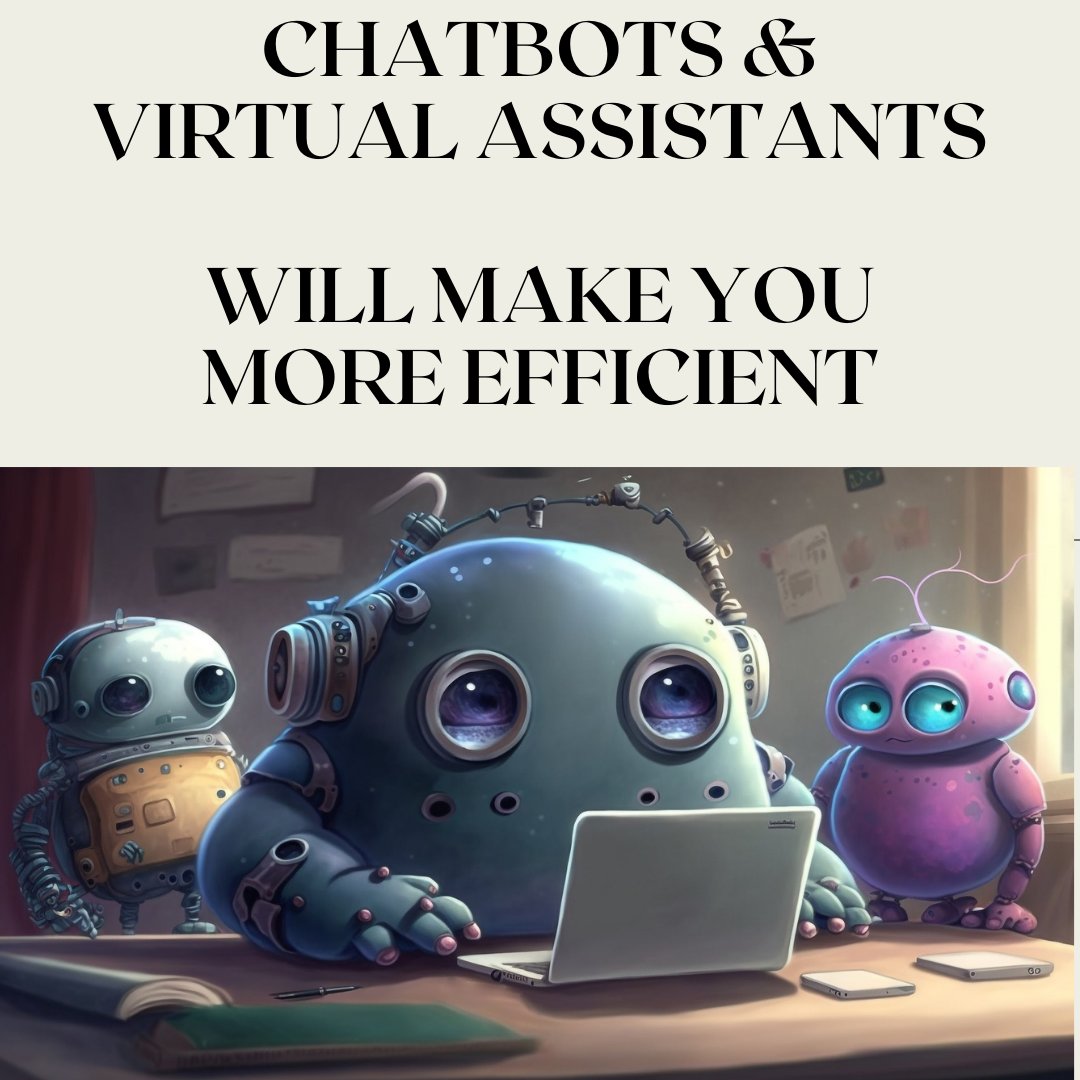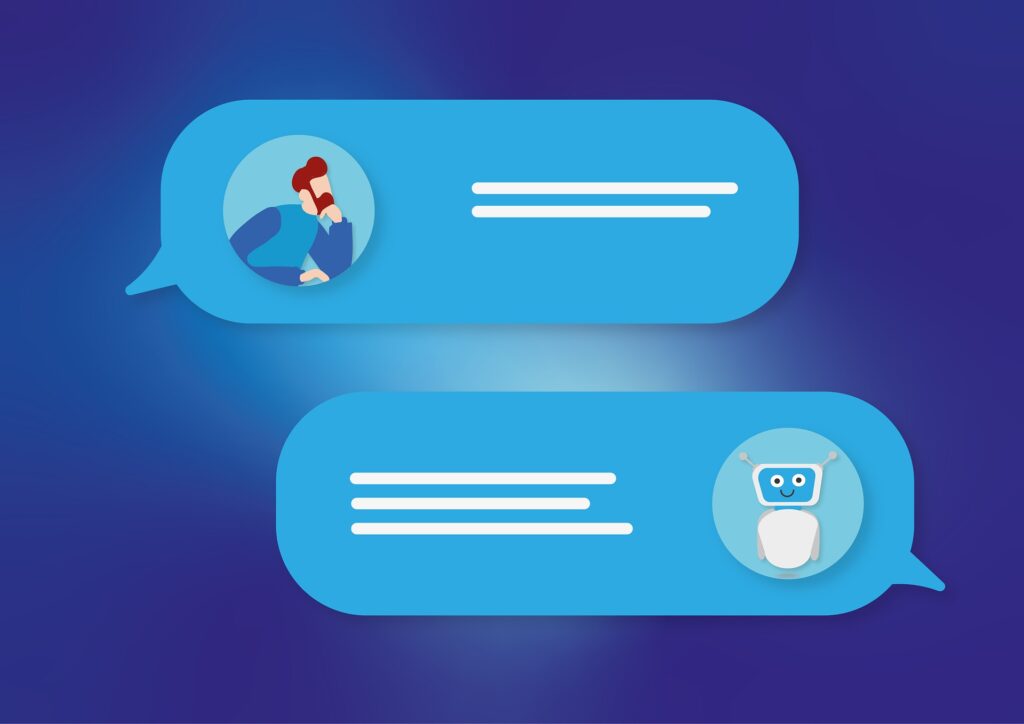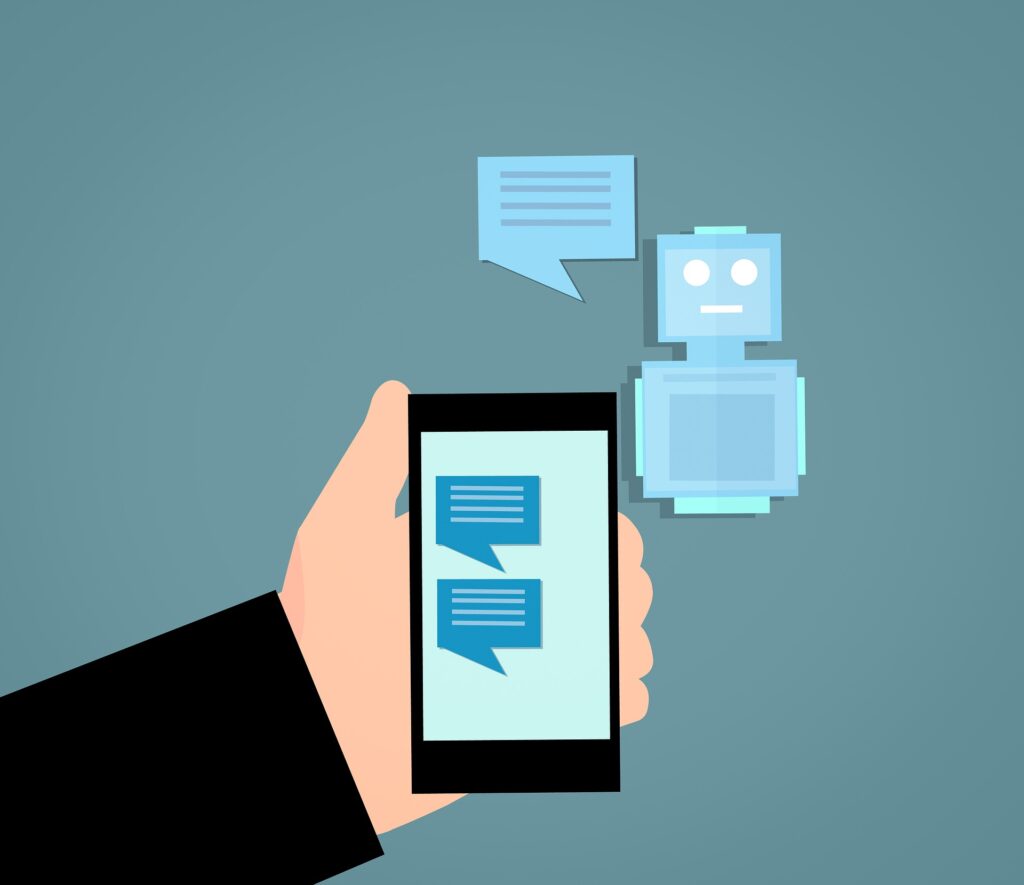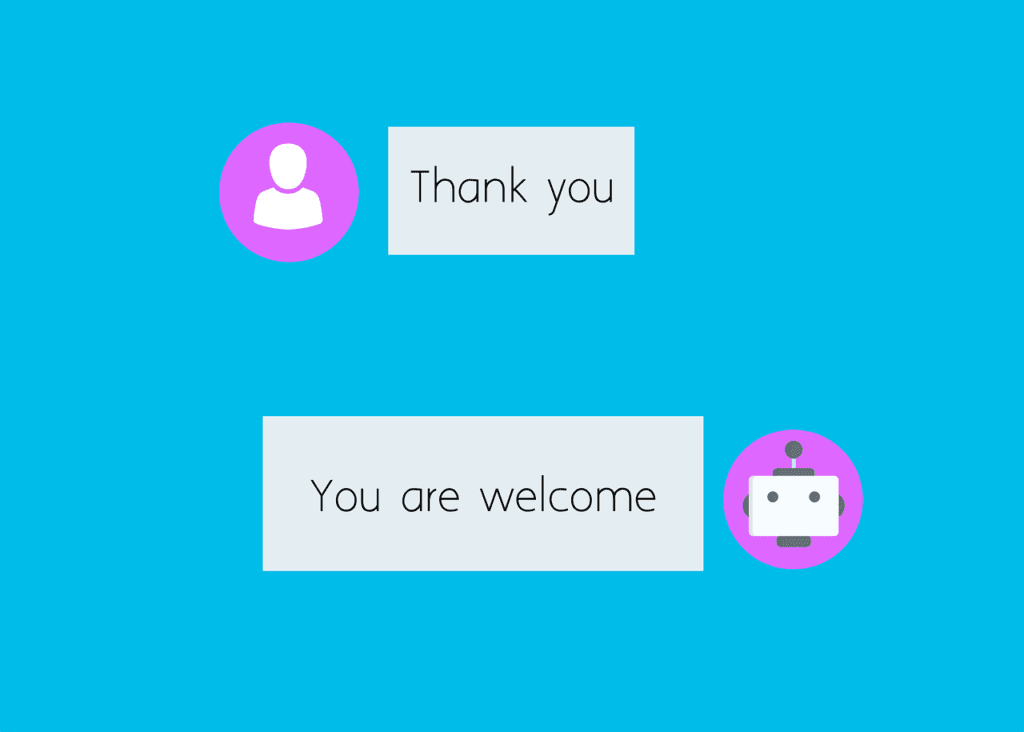
Chatbots & Virtual Assistants
Chatbots and Virtual Assistants will make you more efficient. The benefits of using chatbots and virtual assistants to provide personalized customer support and enhance the customer experience
Chatbots and virtual assistants are AI-powered tools that can provide personalized customer support and enhance the customer experience. Here are some of the benefits of using chatbots and virtual assistants in marketing

Chatbots and Virtual Assistants – 24/7 Customer Support
Chatbots and virtual assistants can provide 24/7 customer support, allowing businesses to respond to customer queries and concerns at any time of the day or night. This can lead to increased customer satisfaction and loyalty, as customers feel that their needs are being taken care of around the clock.
24/7 customer support is an essential aspect of modern business. With customers from all over the world, businesses need to be able to provide support at any time of the day or night. AI-powered chatbots and virtual assistants can provide 24/7 customer support, allowing businesses to respond to customer queries and concerns in real-time.
Let’s take an example of how chatbots and virtual assistants can provide 24/7 customer support:
Suppose an e-commerce company wants to provide 24/7 customer support to its customers. The company can use AI-powered chatbots and virtual assistants to provide instant responses to customer queries and concerns.
Using natural language processing (NLP) and machine learning algorithms, the chatbot can understand and respond to customer queries in real-time. The chatbot can provide information about products and services, track orders, and resolve customer issues.
For example, a customer who is having trouble placing an order can interact with the chatbot, which can guide the customer through the process and resolve any issues. Similarly, a customer who has a question about a product can receive instant answers from the chatbot.
By providing 24/7 customer support, businesses can increase customer satisfaction and loyalty. Customers feel that their needs are being taken care of around the clock, which can lead to increased trust and loyalty.
Overall, AI-powered chatbots and virtual assistants can provide 24/7 customer support, allowing businesses to respond to customer queries and concerns in real-time. By providing instant responses, businesses can increase customer satisfaction and loyalty, leading to increased sales and revenue.
Chatbots and Virtual Assistants – Personalization
Chatbots and virtual assistants can be customized to provide personalized customer support based on each customer’s behavior and preferences. By understanding what motivates their customers, businesses can create customized experiences that resonate with each individual. This can lead to increased engagement and conversions, as customers feel like they are being understood and catered to.
Personalization is an essential aspect of modern customer support. With customers from all over the world, businesses need to provide personalized experiences that resonate with each individual. AI-powered chatbots and virtual assistants can be customized to provide personalized customer support based on each customer’s behavior and preferences.
Let’s take an example of how chatbots and virtual assistants can provide personalized customer support:
Suppose a hotel booking company wants to provide personalized customer support to its customers. The company can use AI-powered chatbots and virtual assistants to provide customized experiences that resonate with each individual.
Using natural language processing (NLP) and machine learning algorithms, the chatbot can understand and respond to customer queries in real-time. The chatbot can also analyze customer data such as previous bookings, location, and preferences to provide personalized recommendations.
For example, a customer who frequently books hotels in New York can receive personalized recommendations for hotels in the city, based on their previous booking history. Similarly, a customer who prefers budget hotels can receive personalized recommendations for budget-friendly hotels, based on their previous booking history.
By providing personalized customer support, businesses can increase customer engagement and conversions. Customers feel that their needs are being taken care of, leading to increased trust and loyalty.
Overall, AI-powered chatbots and virtual assistants can be customized to provide personalized customer support, allowing businesses to provide customized experiences that resonate with each individual. By providing personalized recommendations, businesses can increase customer engagement and conversions, leading to increased sales and revenue.

Chatbots and Virtual Assistants – Efficiency
Chatbots and virtual assistants can handle multiple customer queries simultaneously, reducing the workload on customer support teams. This can lead to increased efficiency and reduced response times, improving the overall customer experience.
Efficiency is a significant benefit of using AI-powered chatbots and virtual assistants for customer support. These AI tools can handle multiple customer queries simultaneously, reducing the workload on customer support teams. This can lead to increased efficiency and reduced response times, improving the overall customer experience.
Let’s take an example of how chatbots and virtual assistants can improve the efficiency of customer support:
Suppose an e-commerce company receives hundreds of customer queries every day, ranging from product inquiries to order status updates. The customer support team struggles to respond to all these queries promptly, leading to increased wait times and decreased customer satisfaction.
To address this issue, the company can deploy an AI-powered chatbot or virtual assistant. The chatbot can be customized to respond to common customer queries, such as product availability and shipping details. The chatbot can also be trained to escalate complex queries to human agents.
Using natural language processing (NLP) and machine learning algorithms, the chatbot can understand and respond to customer queries in real-time. As the chatbot can handle multiple queries simultaneously, it can respond to hundreds of customer queries in a matter of minutes, reducing wait times and improving the overall customer experience.
Moreover, the chatbot can be available 24/7, reducing the workload on the customer support team, and allowing them to focus on complex queries that require human intervention. This can lead to increased efficiency and reduced response times, improving the overall customer experience.
Overall, AI-powered chatbots and virtual assistants can improve the efficiency of customer support by handling multiple queries simultaneously, reducing wait times, and freeing up human agents to focus on complex queries. This can lead to increased customer satisfaction, loyalty, and ultimately, increased sales and revenue for businesses.
Chatbots and Virtual Assistants – Cost-Effective
Chatbots and virtual assistants can provide cost-effective customer support, as they do not require the same level of staffing as traditional customer support teams. This can lead to cost savings for businesses, while still providing high-quality customer support.
One of the significant benefits of using AI-powered chatbots and virtual assistants for customer support is that they can provide cost-effective support solutions. Chatbots and virtual assistants can handle multiple customer queries simultaneously, reducing the need for a large customer support team. This can lead to significant cost savings for businesses while still providing high-quality customer support.
Let’s take an example of how chatbots and virtual assistants can be cost-effective for customer support:
Suppose a healthcare company provides online medical consultation services to patients. The company receives thousands of patient queries every day, ranging from appointment booking to medical inquiries. The traditional approach to customer support would require a large team of support agents to handle these queries. This can be a costly endeavor, as it requires hiring and training a large customer support team.
To address this issue, the company can deploy an AI-powered chatbot or virtual assistant to handle the majority of patient queries. The chatbot can be customized to understand patient queries and provide appropriate responses. The chatbot can also be trained to escalate complex queries to human agents.
Using natural language processing (NLP) and machine learning algorithms, the chatbot can understand and respond to patient queries in real-time. As the chatbot can handle multiple queries simultaneously, it can respond to thousands of patient queries in a matter of minutes, reducing the need for a large customer support team.
Moreover, the chatbot can be available 24/7, reducing the need for staffing night shifts, which can be costly. This can lead to significant cost savings for businesses, while still providing high-quality customer support.
Overall, AI-powered chatbots and virtual assistants can provide cost-effective customer support solutions, as they can handle multiple queries simultaneously, reducing the need for a large customer support team. This can lead to significant cost savings for businesses while still providing high-quality customer support to customers.

Data Collection
Chatbots and virtual assistants can collect data on customer queries and interactions, providing valuable insights into customer behavior and preferences. This information can be used to improve marketing campaigns, product development, and overall customer experience.
One of the key benefits of using AI-powered chatbots and virtual assistants for customer support is their ability to collect data on customer queries and interactions. As chatbots and virtual assistants interact with customers, they can collect valuable data on customer behavior and preferences, such as frequently asked questions, common issues, and preferred communication channels.
This data can be used by businesses to gain insights into customer behavior and preferences, which can be used to improve marketing campaigns, product development, and overall customer experience.
For example, let’s say an e-commerce company deploys a chatbot to handle customer queries. As customers interact with the chatbot, it collects data on customer queries and interactions. The company can use this data to identify common issues and pain points that customers are experiencing. This information can be used to improve the company’s products and services, such as identifying new features to add or improving existing features to better meet customer needs.
Moreover, the data collected by the chatbot can be used to create targeted marketing campaigns. For example, if the chatbot identifies that a significant number of customers are interested in a particular product or feature, the company can create targeted marketing campaigns to promote that product or feature to those customers.
In addition, the data collected by chatbots and virtual assistants can be used to improve the overall customer experience. By understanding customer behavior and preferences, businesses can create more personalized experiences for their customers, such as customizing product recommendations or providing personalized support.
Overall, chatbots and virtual assistants can collect valuable data on customer queries and interactions, providing insights into customer behavior and preferences. This information can be used to improve marketing campaigns, product development, and overall customer experience, leading to increased customer satisfaction and loyalty.
Increased Engagement
Chatbots and virtual assistants can engage customers in a conversational manner, creating a more interactive and personalized experience. This can lead to increased engagement and customer satisfaction, as customers feel like they are having a conversation rather than simply interacting with a machine.
One of the key benefits of using chatbots and virtual assistants for customer support is their ability to engage customers in a conversational manner. Unlike traditional customer support methods, which can feel impersonal and scripted, chatbots and virtual assistants can create a more interactive and personalized experience for customers.
By using natural language processing (NLP) and machine learning algorithms, chatbots and virtual assistants can understand and respond to customer queries in a conversational manner. They can ask follow-up questions, provide recommendations, and offer personalized solutions, creating a more engaging experience for customers.
For example, let’s say a customer contacts a bank to inquire about opening a new account. Instead of navigating through a series of menus and prompts, the customer is greeted by a chatbot that engages them in a conversation. The chatbot can ask questions about the customer’s financial needs and preferences, provide recommendations based on their responses, and guide them through the account opening process. This creates a more personalized and engaging experience for the customer, which can lead to increased customer satisfaction and loyalty.
Moreover, chatbots and virtual assistants can engage customers on a variety of platforms, including social media, messaging apps, and websites. This allows businesses to meet customers where they are, creating a more seamless and convenient experience.
By providing an engaging and personalized experience, chatbots and virtual assistants can increase customer satisfaction and loyalty. Customers feel like they are having a conversation rather than simply interacting with a machine, which can lead to increased engagement and a stronger emotional connection to the brand. Overall, this can lead to improved customer retention and higher lifetime customer value.
Conclusion
In conclusion, the use of chatbots and virtual assistants can provide a range of benefits for businesses looking to enhance the customer experience. By providing personalized customer support, improving efficiency, reducing costs, collecting valuable data, and increasing engagement, chatbots and virtual assistants can help businesses stay ahead of the competition and deliver a superior customer experience. As AI continues to evolve and become more accessible, the role of chatbots and virtual assistants in marketing is likely to become even more significant, leading to further transformation in the marketing industry.
Predictive Analytics with AI: How to Make Accurate Predictions
Blogging Mastery: The Ultimate Guide to Launching, Scaling and Monetizing Your Blog in Record Time





